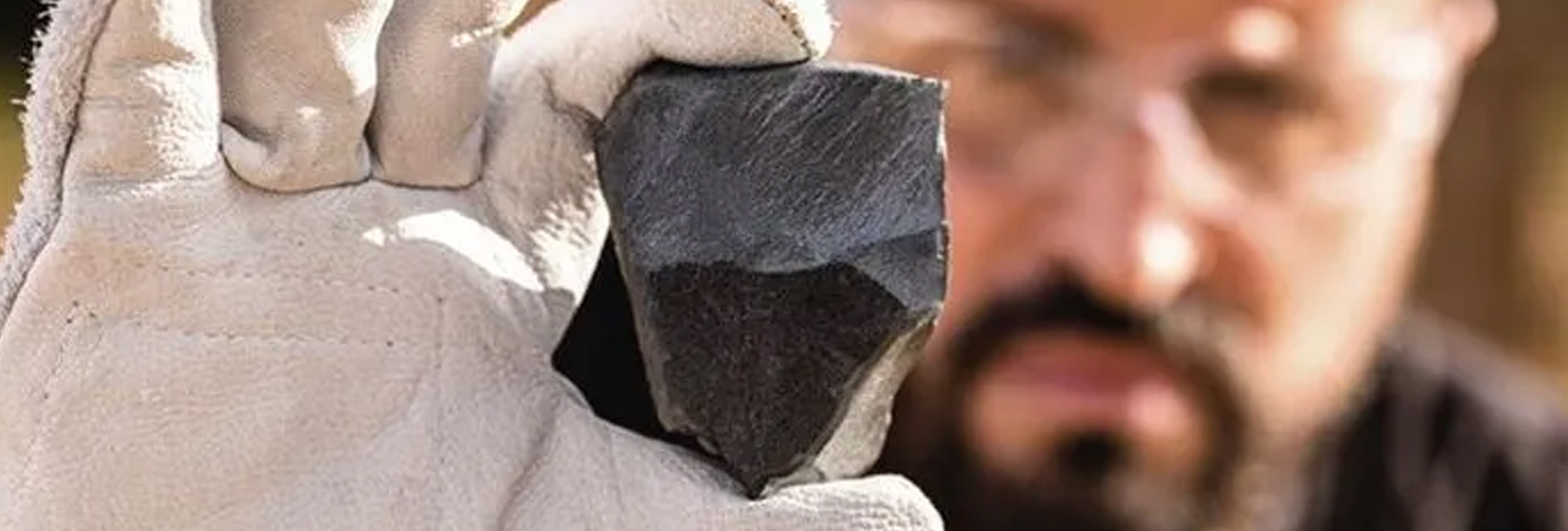Table of Content |
What is Iron Ore?
Iron ore is a type of rock that contains minerals such as hematite, magnetite, and taconite, which are used to produce iron. It is a crucial component in the production of steel, as it provides the iron necessary to create the alloy.
Iron ore is mined in many countries around the world and is typically found in deposits that are located close to the Earth’s surface. The extracted ore is then processed to remove impurities and create pellets or other forms that can be used in steel production.
Rocks and minerals that can be commercially mined for their iron content can be referred to as iron ores. The ores’ colours vary and are caused by a high concentration of iron oxides.
Iron can be found in many different forms, the most common of which are magnetite, hematite, goethite, limonite, and siderite.
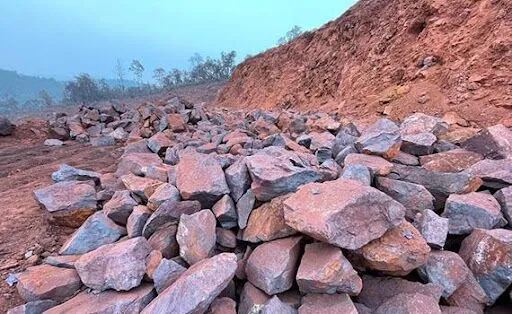
Types of iron ore in India
The consumption of iron is a measure of a nation’s growth. In the form of iron ore, iron is extracted from mines. The proportion of pure iron in various states of iron ore varies. Here is a list of four types of iron ore in India.
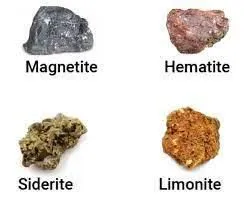
Hematite- Main ore of India
“Oxide of iron” refers to the hematite ore or red ochre. It contains between 60 and 70 per cent ferrous material. It is primarily found in the Dharwad and Cuddapah rocks. It is a large, rugged, lumpy, reddish, or ochre-coloured ore.
Main Kinds of Hematite
- Laminated Hematite
- Micaceous Hematite
- Hematite Breccia
- Hematite Quartz-Schist
Uses of Hematite in India
Hematite is a mineral that is commonly found in India and has several uses in various industries. In the steel industry, it is used as a raw material for the production of iron and steel. Hematite is also used in the manufacturing of pigments, such as red ochre, which is used as a coloring agent in paints and dyes. In addition, it is used in the production of jewelry and other decorative items due to its attractive metallic luster.
Top Hematite Ore Miners in India
- Bihar
- Jharkhand
- Orissa
- Madhya Pradesh
- Chhattisgarh
- Karnataka
- Goa
- Maharashtra
- Andhra Pradesh
The world’s most valuable iron ore is this one. It is the mineral most prevalent in the shallow crust and on Earth’s surface. It is a form of mineral in both igneous and sedimentary rocks.
Magnetite- Black ore
As implied by its name, this type of iron ore in India is magnetic and referred to as ferrimagnetic, along with other naturally magnetic iron-containing minerals. In the 3-D crystal structure of magnetite, which belongs to the hexoctahedral crystal class, the iron atoms are purple, and the oxygen atoms are red.
The primary use of magnetite is essential to iron ore for steel production. In addition, it is a catalyst to produce ammonia and a pigment for paints and ceramics. Its other services are magnetic micro- and nanoparticles for various techniques.
Top Magnetite ore miners in India
- Tamil Nadu (Salem and Tiruchchirappalli districts)
- Karnataka
- Andhra Pradesh
- Kerala
Mineral Composition of Magnetite Ore in India
Magnetite ore is a type of iron ore that is found in abundance in India. The mineral composition of magnetite ore in India includes mainly iron, oxygen, and a small number of other elements such as titanium, aluminum, and magnesium. The iron content in magnetite ore is typically between 25% and 40%, which makes it a valuable source of iron for the steel industry. The high iron content of magnetite ore also makes it ideal for use in heavy concrete and as a component in the production of magnetite-based catalysts. In addition, magnetite ore is often used in coal-washing operations to help separate impurities from coal and improve its quality.
Limonite
The ferrous concentration of the limonite iron ore ranges from 35 to 50%. A mixture of iron ore, oxygen, and water is called “hydrated iron oxide.” Limonite iron ore production in India exists in the Raniganj coalfield, Garhwal and Mirzapur districts of Uttar Pradesh. The other iron ore miners are in the Kangra valley of Himachal Pradesh, in the iron stones of the Damuda series.
Formation and Characteristics of Limonite Iron Ore
Many of the yellowish to yellowish-brown iron oxides generated during the weathering of iron-bearing rocks or deposited as bog, lake, and shallow marine sediments were known as “limonite” before the advent of modern mineral analysis. Hematite, magnetite, pyrite, and other iron-bearing minerals typically weather to create limonite as a secondary substance. This iron ore in India is also found in small amounts in stratified deposits where hydrous iron oxides precipitate as sediment on the bottom of shallow swamps, lakes, and marine settings. These may have an inorganic or biological source. Limonite is highly resistant to deterioration and frequently forms residual deposits. In lateritic soils, it is often the primary form of iron and a colouring agent.
Siderite
Iron carbon is the name given to the siderite iron ore, which contains 10 to 48% ferrous material. It is brown. This type of iron ore in India is a less desirable type of iron ore.
The calcite group of minerals consists of isomorphous connected carbonates and includes siderite. They can partially or wholly replace one another, forming a solid solution series because they share many physical characteristics. For example, iron oxides can be produced simply from siderite. Commonly, siderite is replaced by brown goethite.
Iron ore production in India
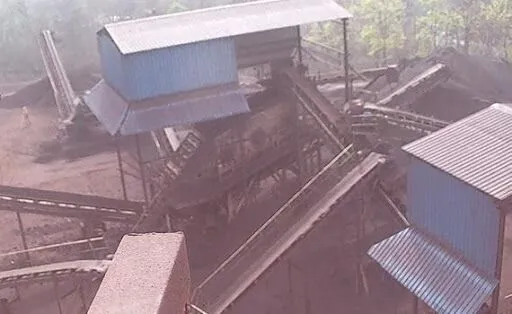
Iron ore is present in some quantities throughout the nation. However, most of the reserves are concentrated in several carefully chosen locations. Over 95% of all Indian reserves are held by just six states: Jharkhand, Orissa, Madhya Pradesh, Chhattisgarh, Karnataka, and Goa. Hence, these states lead the iron ore production in India.
Iron Ore Mining in Major Indian States
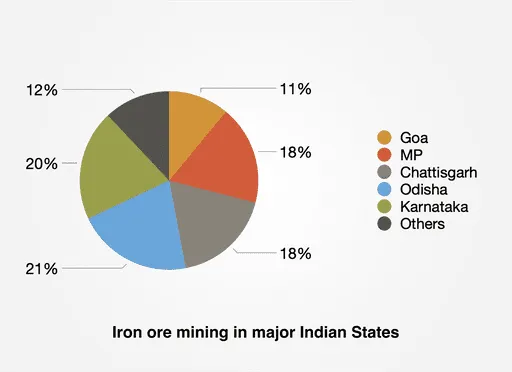
India is the world’s fifth-largest exporter of iron ore. About 50 to 60 percent of the iron ore production in India is exported to nations like Japan, Korea, Europe, and most recently, the Gulf States. India’s largest export market for iron ore is Japan, which accounts for nearly three-fourths of all our shipments.
Sree Metaliks, a trusted name among iron ore companies in India
Read More:
The Scope Of Iron Mining Industry In India
How Is Iron Ore Processed into Pellets?
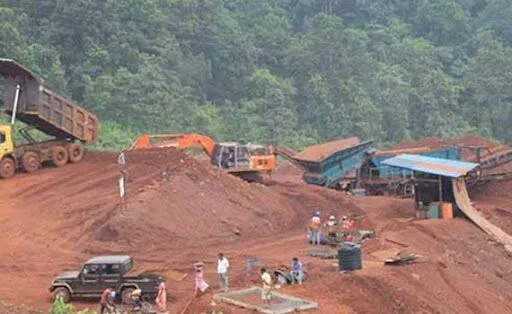
Sree Metaliks Limited, one of India’s top iron ore miners, has its captive mines. The company uses the resource in its integrated steel plants to create finished goods, including sponge iron, billets, TMT bars, pellets, and pig iron.
With various superior products, Sree Metaliks balances its consumers’ needs while boosting iron ore production in India. Its team of experts has successfully and repeatedly shown that it can meet and surpass the expectations of a wide range of clients. Therefore, they have made a name for themselves as India’s best iron ore company.
Their productive efforts and goods attest to our national stature. People value their mining expertise, accurate reporting, and moral character. With their tradition of quality labour and goods, they are the leader among the iron ore companies in India.

